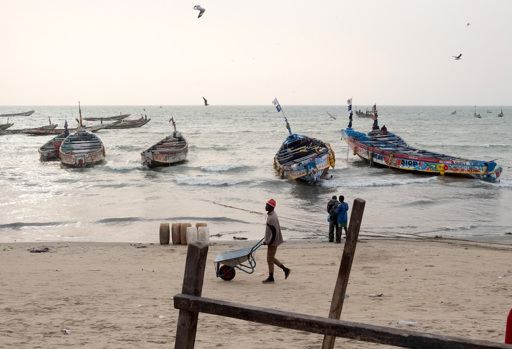For The Gambia, the stakes of fishing are high. The river Gambia’s nutrient-rich waters, which empty into the Atlantic, have made the former British colony a prime fishing ground. But that abundance has also turned the country into one of Africa’s hotspots for illegal fishing. For years, NGOs and international agencies have called attention to the problem. But vested interests run deep, and the state has struggled to defend its marine resources against the twin pressures of foreign fleets and local corruption.
“These trawlers are a menace. Incidents happen every single day, yet the foreign vessels are never held accountable”, says Omar Gaye, of the Gambian Artisanal Fishermen’s Association. As a fisher himself, he knows the risks firsthand. He had to file a complaint after a trawler from the Majilac fleet tore through his nets one night, leaving them in shreds.
National shipping records confirm that Majilac Fishing Company, which runs the fleet, is controlled by a mix of Chinese shareholders and Gambian nationals.
…
The Sustainable Fisheries Partnership Agreement (SFPA) [in The Gambia] remains in force between the European Union and The Gambia. Under the deal, the EU pays The Gambia €550,000 a year in exchange for access by European vessels to catch-limited quotas of high-value species such as tuna and cod. Half of that sum is supposed to be earmarked by the Gambian authorities for developing the fisheries sector. It is intended to pay for monitoring, policy work, and enforcement against illegal fishing.
In practice, however, several trawlers – including the [Chinese] Majilac 3 and Majilac 7 – along with other Chinese-flagged vessels, continue to operate illegally inside the nine-nautical-mile coastal zone reserved for artisanal canoes. At times, they edge to within just three miles of the shore. Satellite data shows that these same trawlers continue to dock at Hansen Seafood’s facilities to this day.
In response to questions for this investigation, [the Spanish multinational company] Congelados Maravilla reiterated that it stopped purchasing seafood from the [Chinese] Majilac trawlers a year ago. Still, the vessels continue to unload their catches at the company’s dock under earlier agreements. The firm insists that all fish landed at their dock is now bought by other wholesalers, and that not a single octopus or cuttlefish is currently purchased by the Spanish group.
…
The scale of the problem extends far beyond The Gambia’s shores. Illegal, unreported and unregulated (IUU) fishing accounts for one-fifth of global fish catches, according to the Financial Transparency Coalition. Its market value is estimated at between $10 billion and $23.5 billion annually. West Africa alone is believed to represent roughly 40 percent of this total. The result is a loss of more than $9 billion for countries in the region, in addition to shrinking biodiversity and the depletion of a vital source of protein for West Africans.
…
The depletion of West Africa’s fish stocks is pushing the region’s coastal dwellers to seek livelihoods elsewhere. It is fueling migration toward the European Union, most notably the perilous route to the Canary Islands.
…


